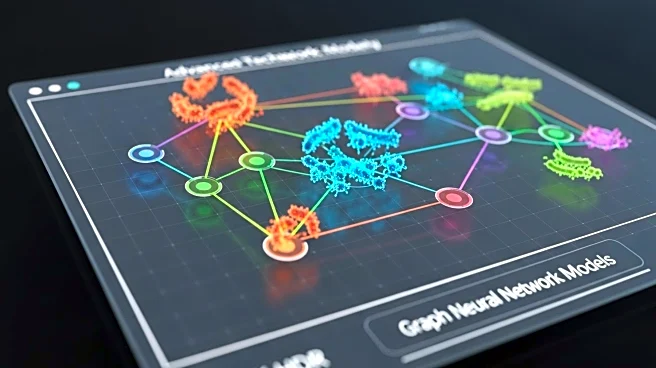What's Happening?
Recent research has demonstrated the effectiveness of graph neural network models in predicting the structure and temporal dynamics of microbial communities in wastewater treatment plants (WWTPs). The study involved analyzing 4709 samples from 24 full-scale WWTPs using 16S rRNA amplicon sequencing. The models utilized advanced computational methods, including artificial neural networks, to predict microbial interactions and community dynamics. By employing pre-clustering methods and graph neural networks, researchers were able to achieve high prediction accuracy for microbial abundances, particularly for key bacteria involved in wastewater treatment processes. The study highlights the potential of these models to improve the management and operational efficiency of WWTPs by forecasting microbial community changes.
Why It's Important?
The ability to accurately predict microbial community dynamics in WWTPs is crucial for optimizing treatment processes and ensuring environmental compliance. These predictions can help plant operators anticipate and mitigate issues related to microbial imbalances, such as poor sludge settling and effluent quality. By improving prediction accuracy, WWTPs can enhance their operational efficiency, reduce costs, and minimize environmental impacts. The study's findings also suggest broader applications for graph neural network models in other ecosystems, potentially transforming microbial ecology research and management practices.
What's Next?
The research indicates that further refinement of prediction models could lead to even greater accuracy and applicability across different environmental contexts. Future studies may explore the integration of additional data types, such as environmental variables, to enhance model predictions. Additionally, expanding the use of these models to other ecosystems, such as marine environments or human gut microbiomes, could provide valuable insights into microbial dynamics and their implications for health and environmental management.
Beyond the Headlines
The study underscores the importance of computational advancements in ecological research, highlighting ethical considerations in AI applications. As AI models become more prevalent in environmental management, ensuring transparency and accountability in their use will be critical. The research also raises questions about the long-term impacts of AI-driven predictions on ecological conservation and resource management strategies.










